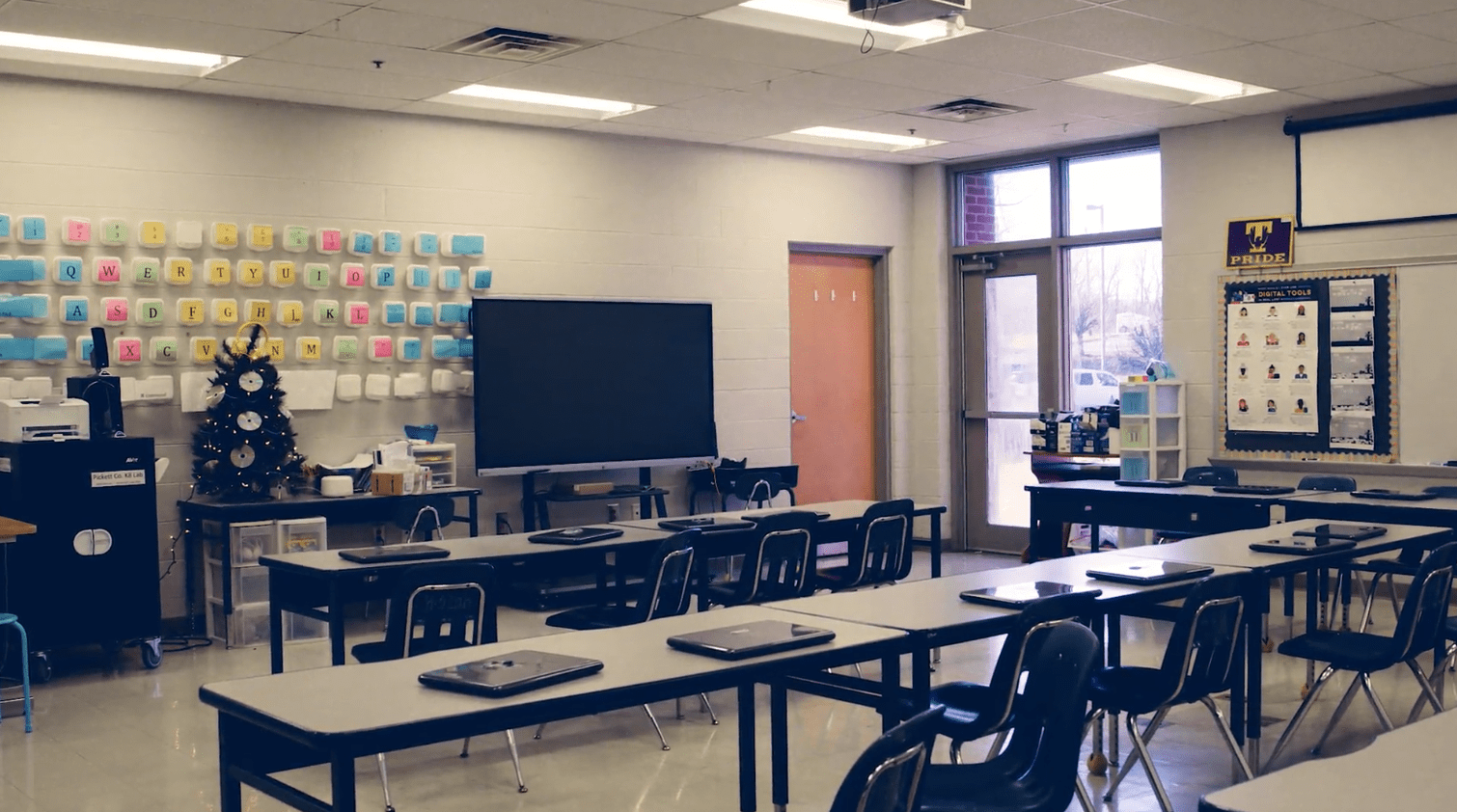Tennessee teachers and students can ‘sense’ the health benefits of an energy efficient school

Just over 450 students and teachers pour into the Pickett County K-8 gym for an all-school assembly. Their voices echo off the concrete walls. Many don’t notice the large overhead gym lights, except for a few students – and principal Julia Barber has always been concerned for them.
“The old lights in the gym, the cafeteria and even some classrooms had a constant buzz,” says Barber. “Some of our children have sensory processing disorders and are on the autism spectrum. They would focus on that buzz and could not focus on what they needed to do. One of my students sat with his hands over his ears, and he would look and say, ‘Make it stop, make it stop.’” So, he often went into the office and put on noise-canceling headphones. But even then, the lights would flicker and agitate him.”
“We try to live within our means”
Pickett County, Tennessee, is just over the Kentucky state line. In the summertime, visitors head to the county’s main attraction — Dale Hallow Lake. The majority of residents are retired and live on fixed incomes. Diane Elder, director of schools, says it is one of the main reasons why the school district hasn’t asked voters for a tax increase in 15 years.
“We take pride in not putting that burden on them. We try to live within our means. We don’t have some of the things many larger schools have, but we feel like we have a really good school system.“
With a tight budget, Pickett teachers rely on fundraising. The school gives them two weeks to raise money for classroom supplies like copy paper, pencils and notebooks. “We also do some school-wide fundraisers,” says Barber. “Those are for things for copier maintenance that are not necessarily included in our budget from our central office. We spend a lot of out-of-pocket that I don’t think most people realize.”
Pickett’s school staff has been so self-reliant for years that Elder could hardly believe that anyone would help them improve their school for free.
Elder recalls attending a directors’ conference when Clay Hoover, a program manager at TVA EnergyRight, approached her with an interesting offer: the chance to join a pilot program, with nine other schools, called School Uplift. TVA engineers would audit their buildings and note where the schools could improve their energy efficiency. Each of the participating schools would enroll their maintenance personnel in a 12-month energy management training course — all at no cost.
“I said, ‘Clay, you know, this just sounds too good to be true.’ But he said, ‘I promise you, there’s no catch here.’”
“Diane’s got a tough job,” says Hoover. “She wears so many different hats. She is the maintenance manager, the transportation director and the director of the schools. And now we’re asking her to wear a hat as an energy champion, and she’s really taking it on just like all of her other roles. She’s done an excellent job at it, and we’re seeing great success in Pickett County because of her leadership.
The audit revealed that none of the air filtration systems in the HVACs were working at the K-8 school. The units were installed in 2000, after the construction of the building. Elder believes that the lack of filtration led to an uptick in sinus infections after holiday breaks. “It was just the inside air circulating, what little it did circulate. Coming back from winter break, there was almost a stale, musty smell to the building.”
Eighth-grader Johnny Jenkins recalls how his allergies would flare up. “My nose would run, and I could feel the drainage in the back of my throat. It was awful, and I was tired all the time. It’s hard to do your work and pay attention.”
Elder says the School Uplift energy management training helped her learn a lot about the building. She also realized there were plenty of low- to no-cost energy-saving solutions she could easily implement. “Simple things, just like flipping a light switch off when you walk out of the room. We asked the teachers to take out the small mini-fridges and coffee pots from their classrooms.”
“As a teacher, you don’t really know that somebody is paying the electric bill,” says Barber. “But as an administrator, when you actually see what that electric bill runs, you think, ‘Oh, now we’ve got to do better.’”
At the conclusion of the 12-month training program, TVA EnergyRight, in partnership with Volunteer Energy Cooperative, awarded Pickett County K-8 with a $200,000 grant. The State of Tennessee’s Energy Efficient Schools Initiative matched it, for a total of $400,000 to use for building upgrades to provide more energy savings to the school.
“When Ms. Elder called and said y’all have been awarded the grant, I mean, I literally ‘yee-hawed’ in the office,” recalls Barber. “This was an opportunity of a lifetime. As a rural district, we don’t have a lot of school funds. This grant allowed us to upgrade everything to more efficient HVAC units and lights.”
While the grant was for their K-8, Elder says it helped the district redirect money into materials and supplies for the high school. “We are replacing some of the older HVAC units that we might not have done before because we didn’t have the budget.”
A difference they can see and hear
Jenkins says he’s his sinus infections are practically gone, thanks to the new HVACs and working air filtration. “I’ve noticed a big difference. I’ve been able to breathe easier.” But it wasn’t until new, flat LED light panels were installed in the hallways and classrooms that some students could truly see the difference from the School Uplift grant.
“When you walked into the school before, things looked like they were in a fog,” says 8th grader Aubree Whittenburg. “Kind of like everything was yellow.” She loves the new LED lights that were installed with the grant money because they make everything look brighter. Classmate Penny Daniels agrees, saying that the LED dimmers add a special touch. “With the old lights, there were only two settings. You couldn’t dim them. With the new ones, you can put them in different modes, have them dim or have them bright.”
Barber says teachers also use the dimmers to help calm a rowdy class. “That is a major positive for us, especially at the elementary level.”
She says the students agitated by the old lights have also seen a difference with the new LEDs. “The lights don’t buzz or flicker, so they can participate in activities in the gym, and they don’t have to wear headphones.”
Both Barber and Elder say they’re thankful for the School Uplift program, and they encourage other districts in the valley to participate. “We would not have been able to do this,” says Butler. “Teachers are so appreciative, and students, even though they might not have the words, are not in a yellow building anymore.”
Related stories:
Alvin C. York Institute makes the grade, saving over $40,000 in TVA EnergyRight School Uplift pilot program
Bledsoe County Schools transform their energy training into cool savings



